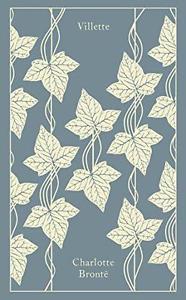
I am not sure why I have never read Villette until now but I have a vague recollection of starting it before as a teenager and, not finding it as immediately engaging as Jane Eyre, not getting far enough in to give it a fair chance. This time around I became engaged with it almost straight away and really enjoyed it, although it is a more difficult read than Jane Eyre – I think because the central character is more difficult to engage with than Jane.
Villette is set in a fictional French town where our heroine, Lucy Snowe, journeys almost by chance after her family and employer die. Lucy finds herself employment at Madame Beck’s boarding school and it is here that the majority of the novel is set. Lucy soon progresses from a governess to Madame Beck’s children to an English teacher in the school and the novel deals with her time at Madame Beck’s establishment as well as her, often complicated, relationships with those around her.
Lucy Snowe, as her name suggests, is outwardly quite a cold character although she confides in the reader that she lives “two lives – the life of thought, and that of reality”. It is this which makes her a fascinating protagonist, but also sometimes an unreliable and seemingly unfeeling narrator. Often Lucy admits that she has withheld information from the reader and she does not always share her feelings with anyone. Yet I found that this made the moments when she confided in the reader to be more striking:
“I had feelings: passive as I lived, little as I spoke, cold as I looked, when I thought of past days, I could feel. About the present it was better to be stoical; about the future – such a future as mine – to be dead. And in catalepsy and a dead trance, I studiously held the quick of my nature.”
I found that the moments when Lucy spoke candidly revealed more about her character for being rare and, although sometimes I became frustrated at her apparent lack of feeling and the iron control of her emotions, underneath I believe she was full of feeling which only occasionally found release. It also has to be remembered that at the time the novel was written heroines such as Jane Eyre were rare, and Lucy Snowe I found to be a much more life-like character in a way despite (or because of) her solitary nature. She is held back by her gender and class, finds herself in a foreign land full of people who distrust her because of her nationality and religion, as well as battling with depression.
For me, the book’s main interest was in the particularly well-drawn and often eccentric characters. Madame Beck, the mistress of the school where Lucy teaches, was a particularly striking character in her surveillance of staff and pupils alike through underhand means. My favourite character was M. Paul – a eccentric literature teacher who suffers from ‘unreasonable moods’ and whom Lucy compares to Napoleon Bonnaparte. These two characters are wonderfully well-drawn and provide many instances of humour within the novel.
Although not as easy to read as Jane Eyre (sorry for the comparison but it seems an obvious one to make), there was so much that I enjoyed about Villette and the vivid characters made it an extremely engaging read. I also enjoyed the ambiguous ending, but my Penguin Classics edition had an excellent footnote and section of the introduction which dwelt on this for anyone who detests being left in the dark. I have recently started to note down passages and words from books that I found striking, so I will end my review with a few of those that I didn’t mean to fit into this review:
“…the wingless hours plod by in the likeness of tired tramps prone to rest at milestones.”
“Silence is of different kinds, and breathes different meanings…”
“I was full of faults; he took them and me all home.”
